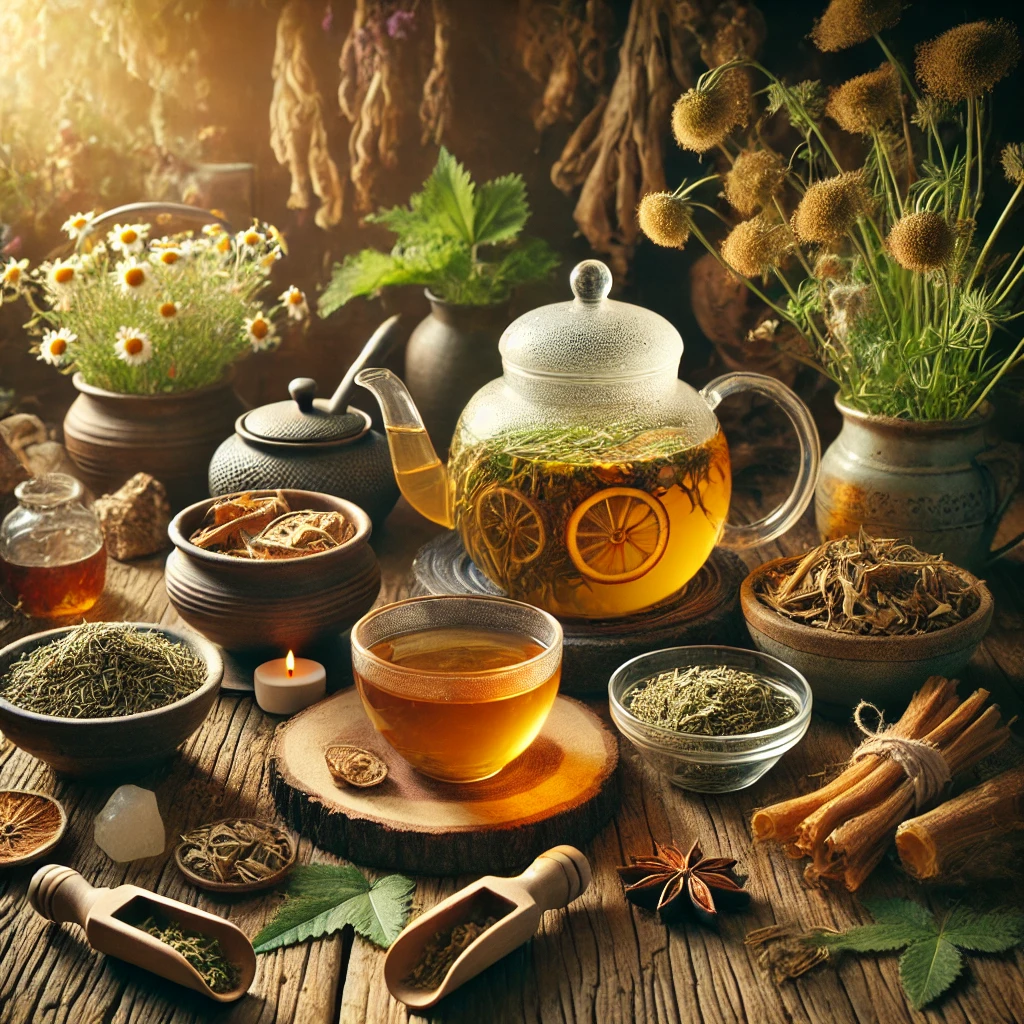Overview
Herbal infusions and decoctions are foundational preparations in herbal medicine used to extract the healing properties of plants through water. Simple yet powerful, these traditional methods provide nourishment, healing, and energetic resonance, serving as sacred bridges between plant allies and the body-mind-spirit system.
Unlike tinctures or capsules, water-based preparations carry the essence and vibration of the plant in a gentle, accessible form. Whether sipped slowly in ritual or used as part of a daily wellness routine, infusions and decoctions invite deep, whole-body healing.
Definitions
| Preparation | Description |
|---|---|
| Infusion | A water extraction made by steeping soft plant parts (leaves, flowers) in hot water. Ideal for delicate, aromatic, or nutrient-rich herbs. |
| Decoction | A method for extracting constituents from tougher plant parts (roots, bark, seeds) by simmering in water. Best for hardy, mineral-rich herbs. |
Key Differences Between Infusions and Decoctions
| Aspect | Infusion | Decoction |
|---|---|---|
| Plant Parts Used | Leaves, flowers, soft aerial parts | Roots, bark, berries, seeds |
| Heat Method | Boiled water poured over herbs | Herbs simmered in water for 15–45 minutes |
| Preparation Time | 15 minutes to several hours | 20–60 minutes (or longer for stronger decoctions) |
| Energy Quality | Light, uplifting, cooling, Yin | Deep, grounding, warming, Yang |
Benefits of Herbal Water Preparations
| Physical Benefits | Examples |
|---|---|
| Hydration with Healing | Herbal teas replenish fluids while delivering vitamins and minerals |
| Gentle, Daily Support | Ideal for long-term use without over-stimulation |
| Digestive, Immune & Nervous Support | Chamomile, lemon balm, nettle, elderflower, licorice root, etc. |
| Cleansing & Detoxification | Dandelion, burdock, red clover, cleavers |
| Sleep & Emotional Calm | Skullcap, lavender, passionflower, oatstraw |
Spiritual & Energetic Uses
Herbal infusions and decoctions also carry vibrational energy, making them powerful tools for:
- Aura cleansing (e.g., rosemary or sage infusion in a spiritual bath)
- Chakra balancing (e.g., tulsi for heart, ginger for root, mugwort for third eye)
- Inner alchemy and ritual healing
- Moon cycle rituals or seasonal transitions (e.g., rose and calendula for spring renewal)
Infusions made with prayer, intention, or moon-charged water can also serve as liquid offerings to spirit guides, ancestors, or elemental forces.
How to Prepare an Herbal Infusion
- Boil water (preferably spring or filtered)
- Place 1–3 teaspoons (or tablespoons for nourishing herbs like nettle or oatstraw) of dried herb in a jar or teapot
- Pour boiling water over the herbs
- Cover and steep for:
- 10–15 min for lighter herbs (e.g., mint, chamomile)
- 4–8 hrs for deep nourishing infusions (e.g., nettle, red raspberry leaf)
- Strain and enjoy warm or cold
How to Prepare a Decoction
- Add 1–2 tablespoons of dried roots, bark, or seeds to 2–3 cups of cold water
- Bring to a gentle boil, then reduce to a simmer
- Cover and simmer for:
- 20–60 minutes depending on the herb and strength desired
- Strain and drink, or store for up to 48 hours in the refrigerator
Examples of Powerful Herbal Combinations
| Goal | Infusion or Decoction Blend |
|---|---|
| Adrenal Support | Ashwagandha root, licorice root (decoction) + oatstraw (infusion) |
| Deep Nourishment | Nettle, red clover, oatstraw, alfalfa (overnight infusion) |
| Lung & Immune Support | Elderberry, elecampane, ginger root (decoction) |
| Emotional Clarity | Lemon balm, rose, tulsi (infusion) |
| Menstrual Balance | Raspberry leaf, cramp bark, chamomile (infusion) |
| Sleep and Nervous System | Skullcap, passionflower, lavender (infusion) |
Storage and Ritual Use
- Store in the refrigerator and use within 24–48 hours for freshness
- Add infusions to ritual baths, foot soaks, or spiritual floor washes
- Sip during meditation or journaling with an affirmation or mantra
- Infuse under moonlight or crystal grids for added vibrational resonance
Cautions & Considerations
- Use clean, organic herbs and avoid aluminum cookware
- Some herbs require practitioner guidance (e.g., licorice, valerian, comfrey)
- Not all herbs are safe for pregnancy or children—research thoroughly
- Respect the plant spirit—harvest or prepare with intention and gratitude
Related Subcategories
This entry fits within:
- Herbal Healing Systems
- Holistic Nutrition & Healing Diets
- Plant Spirit Medicine
- Rituals & Ceremonial Tools
- Mind-Body-Spirit Therapies
Visual Element Recommendation
Suggested Visuals:
- Infographic: “Infusions vs. Decoctions: What’s the Difference?”
- Background Image: “Herbal Teapot with Dried Herbs, Root Slices, and Crystals”
- Carousel Post: “Water-Based Herbal Healing: Top Infusion and Decoction Blends”

